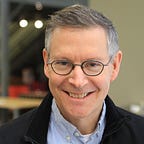Reading
Throughout my life I’ve read. A lot. I discovered a trove of books in my grandparents cupboards, books that had originally been purchased for my father and my uncle. I devoured them. Tom Sawyer, Tom Sawyer Abroad, Huckleberry Finn, Tom Swift and His _______ (there were dozens of these), Ivanhoe, and on and on. When I was still just eight or nine I’d haunt Salvation Army and St. Vincent De Paul stores to buy these old books for 10 or 15 cents apiece.
Most of the books my grandparents bought for my father and his brother were intended to satisfy young boys of the prior generation. They were often books about boys, but the world in which those boys lived was so different from mine. They were coming of age between the first and the second world war. They were captivated by the technology of their time – automobiles, airplanes, motorcycles.
As I grew older, I began to spend more and more time in the public library where I discovered Robert Heinlein, Isaac Asimov, Ray Bradbury, Theodore Sturgeon, Philip K. Dick, Andre (Alice Mary) Norton and a hundred other writers of science fiction. I read anything I could get my hands on 98% of it was fiction, and 90% of this was probably science fiction, but I also loved A. Conan Doyle’s Sherlock Holmes, the short stories of Saki, and O. Henry. I am, even now, incredibly grateful to my parents and my experience of life as a child. I had the means, the freedom, and the support and encouragement of parents and teachers to read.
I can’t imagine a world or a life without books. And while most of what I read is nonfiction these days, the fiction I do read is a really valuable part of my life and perspective. Over the past several months the fiction has included The Overstory (A Novel), by Richard Powers and Song of Solomon, by Toni Morrison; and I’m currently reading “The Bluest Eye,” also by Morrison. I don’t don’t read enough fiction, and I sometimes find that unless the writer is extraordinary, I can’t fight my way to the end. Great writers – Richard Powers, Toni Morrison, Gabo, Neil Gaiman, and so many more – engage me, and once I’ve begun, I’m driven to finish what they’ve written.
But the vast majority of books I’m reading today and have read over the past twenty years are works of nonfiction. They take me to school. Invite me to go down the rabbit hole and be changed by the experience. Recent favorites: Evil Geniuses: The Unmaking of America, by Kurt Andersen (how Milton Friedman, Louis Powell, the Kochs, Irving Kristol and the supply side neocons Cheney and Rumsfeld ushered in the age of inequity – and iniquity); This Could be Our Future, by Yancey Strickler (introducing “Bentoism” a model for taking into account future you and future us when making the big decisions); The Startup Community Way, by Brad Feld & Ian Hathaway (it turns out that startup communities are actually complex systems and we can help them thrive and serve their purpose – helping entrepreneurs succeed – if we understand this); Intimations, by Zadie Smith (the age of COVID seen through the eyes of a woman who sees things others miss and writes really well); Between the World and Me, by Ta-Nehisi Coates (a man writes brilliantly to his son of race and his life, fears, and awakenings to the full import of the challenges he must face and the struggle he must undertake); Stamped from the Beginning: The Definitive History of Racist Ideas in America, by Ibram X. Kendi (definitive indeed, this is a badly needed but horrible dose of eye-opening medicine to wash away any foolishness that America and Americans ever managed to come to terms with race and racism); The Autobiography of Malcolm X; What it Takes, Stephen Schwarzman; The Goal, Elihu Goldratt; Working, Robert A. Caro; Talking to Strangers, by Malcolm Gladwell; Tools for Conviviality, Ivan Illich; The 15 Commitments of Conscious Leadership; multiple books on Platforms and Networks; and more.
I’ve got the equivalent of a night stand, but because it’s on my Kindle, its hundreds of books. But here are a few of the books that live in that bucket: Begin Again: James Baldwin’s America and Its Urgent Lessons for Our Own, by Eddie S. Glaude, Jr.; Who Cooked Adam Smith’s Dinner? by Katrine Marçal; How to Lead: Wisdom from the World’s Greatest CEOs, Founders, and Game Changers, by David M. Rubenstein; The System: Who Rigged It. How We Fix It. By Robert Reich; Chaos Engineering: System Resiliency in Practice, by Casey Rosenthal & Nora Jones; Dark Money, by Jane Mayer; The Paper Menagerie, by Ken Liu; Exchalation, by Ted Chiang; The City We Became, by N.K. Jemisin; It’s Not Complicated: The Art and Science of Complexity in Business, by Rick Nason and so so so many more.
Writing, reading, and learning seem to me to be – like the computer, the Internet, and Zoom – the gift that keeps on giving during the time of COVID. Something I refuse to take for granted. I want to celebrate these amazing gifts here. And extend a thank you to those of you who have written the books and articles that help me make sense of the world I live in, the world we live in together.
